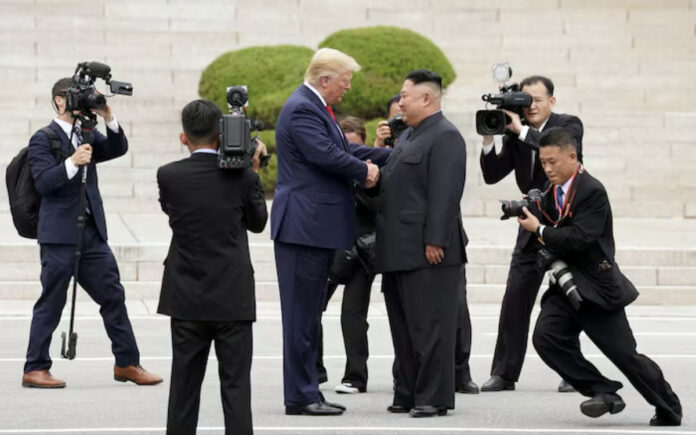Washington: Donald Trump has frequently highlighted his relationship with North Korean leader Kim Jong Un. However, if the newly elected president intends to pursue another summit, he will encounter a more assertive Kim, now equipped with an expanded missile arsenal and stronger ties with Russia.
Following a tense exchange of nuclear threats early in Trump’s first term, the former president met with Kim in three unprecedented summits—in Singapore, Hanoi, and at the demilitarized zone (DMZ) separating the two Koreas—in 2018 and 2019. “We would’ve had a nuclear war with millions of people killed,” Trump told Fox News last month. “And when I was in there, I got along great with Kim Jong Un.”
While many proponents of diplomatic engagement appreciated the de-escalation that followed these meetings, the summits ultimately did not yield a sustained transformation in North Korea’s behavior or denuclearization plans. Outgoing President Joe Biden’s administration struggled to reignite diplomatic engagement with Pyongyang, as North Korea resisted talks.
Since Trump’s last face-to-face meeting with Kim, North Korea has significantly expanded its missile capabilities. Pyongyang now possesses a wide array of intercontinental ballistic missiles (ICBMs), hypersonic weapons, and short-range missiles—many of which could target both the U.S. mainland and American military bases in the region. North Korea has also reopened its nuclear testing facilities and, according to American and South Korean officials, appears prepared to resume testing whenever Kim decides.
Moreover, North Korea has deepened its defense ties with Russia, signing a mutual defense treaty and reportedly deploying thousands of troops to assist Moscow’s military operations in Ukraine. In turn, Russia has supported North Korea with crucial resources like oil and has used its veto power at the United Nations to hinder international sanctions enforcement.
Although Trump’s team has not commented on potential new meetings with Kim, analysts and diplomats in Seoul suggest that Trump’s recent comments indicate he may seek to rekindle dialogue with the North Korean leader. “Trump feels that his engagement worked well during his first presidency in that he feels that he ‘solved’ the North Korean nuclear issue,” said Ramon Pacheco Pardo of King’s College London. “Plus, Trump’s summits with Kim attracted significant media attention, which he clearly relishes.”
The former president now faces a far more complex geopolitical environment, with North Korea’s close alignment with Russia and other global hotspots like Ukraine, China, and Iran creating a deeply interconnected landscape. “President Trump faces a different geopolitical landscape than in 2021,” a former official from Trump’s first administration commented. “Any substantial engagement with North Korea will need to wait a bit.”
The strengthened alliance between North Korea and Russia, coupled with the unpredictability of a renewed Trump administration, has left officials and diplomats from Europe to Asia reevaluating their strategies. A senior official from South Korea’s presidential office noted that while Trump’s campaign comments may suggest a certain direction, it’s unclear what approach he would adopt in office.
Also Read | Trump’s ‘Protection Money’ Demand Could Spur New Taiwan Arms Orders
In December, Trump publicly dismissed a report that he was considering allowing North Korea to freeze its nuclear program—rather than fully denuclearize—in exchange for sanctions relief and other incentives. Observers, however, note that Trump’s policies are often fluid.
Pardo believes North Korea may at least explore talks with the U.S. to gauge potential offerings, as easing sanctions depends on improved relations with Washington. He added that Trump might even consider formally recognizing Pyongyang as a nuclear power.
Also Read | Key Issues at COP29: Climate Finance, Fossil Fuel Transition, and Adaptation Plans in Focus
Bruce Klingner, a former CIA analyst now with the Heritage Foundation, agreed that Kim might see a potential benefit in reaching out to Trump. In August, North Korea demanded that Washington cancel joint military exercises and halt the rotation of strategic assets, two actions that Trump paused in 2018. “Kim could pitch a peace declaration or treaty to Trump as a major accomplishment potentially worthy of a Nobel Peace Prize, though it would do nothing to actually reduce the threat to the United States and its allies,” Klingner noted. “Such an agreement could even provide a foundation for reducing U.S. forces in South Korea and Japan.”



